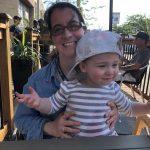Written by Terri-Lynn Langdon, Lead Writer and Editor

I am a wheelchair- using mother and a PhD student at OISE in Social Justice Education. When the lockdown in Toronto began we lost access to daycare and we also lost more than one support person (Nurturing Assistants) who felt that their own lives were too disrupted by the pandemic to continue to provide ongoing support to us. Without this direct support neither myself nor my child can shower safely, and I have no means of taking my twenty-one month old outside on my own. On top of which our building has been plagued with significant apartment maintenance issues all summer which has meant I have had to solve big family pandemic issues for 4 months and counting….

At the time, my private practice was still in full-swing, in addition to school and it felt as though everything had changed overnight. University of Toronto (U of T) has a number of disabled student-parents, one of them is Anita Kaiser who is a research trainee at KITE, Toronto Rehab, University Health Network and a PhD student at U of T in the Rehabilitation Sciences Program. Anita has completed published graduate work on Parents with Disabilities and Spinal Cord Injuries. She is also the mother to a 12 year old daughter and living with a spinal cord Injury. Many years ago, I really felt lucky to see how Anita cared for her child using adaptive equipment (such as a crib, breast-feeding pillows, etc).
We sat down to talk about mothering as student parents at U of T. When I asked Anita about myths and misconceptions about disabled parents, she thought about this for a moment and then said, “well you always have to be the super mom or the super parent because everything that we do as disabled parents is met with much more scrutiny and criticism”. She also shared that in the past some people have assumed that she is not an active parent because she is a wheelchair user. She shared that at a gathering many years ago with her husband someone remarked that “her husband must have to take on the role of the mom and the dad.” I know as much as Anita does that this is not the case. This got us both thinking about the parts that I can’t do as a wheelchair-using mom.
When my daughter was born I realized very quickly that bathing her on my own was not going to be possible. I was worried about tummy-time as well because I couldn’t pick my child up from the floor. I also can’t change a crib sheet on my own. Now that my daughter is two she can stand in the adapted shower, but it took us a while to get there. I also can’t take my child to an open space to run around independently because we live in the dense downtown core and don’t have access to an accessible stroller. My child does occasionally climb and explore places that I just can’t access such as the back of the couch at home and she ventured into a large flower pot at the park recently.
This was true for Anita when her child was a toddler as well. Bathing was a challenge until her daughter could stand beside her in the shower. What is crucial here, is that disabled moms do a lot and absolutely everything else to breast-feeding, nappy changes, preparing food, playtime, bed time and limit-setting. And as student parents and career researchers we both know about writing into the wee hours of the night (when that is possible). As Anita shared, career researchers don’t clock out at 5:00pm and moms and parents certainly can’t do that either.
Anita and I are in different stages in our parenting. Anita’s daughter is 12 and my child is approaching 2 years of age but we both discussed how we are worried about the well-being of our children. Anita shared that attending to her daughter’s psychological needs as a parent has required due attention. Anita has shared that being in isolation and feeling lonely has brought her daughter to tears at times. My child, Jaycie, struggled more because her development at the moment is really focused on acquiring fun and new physical skills and I worried about this a lot because I can’t take her into green spaces independently. For the first two weeks of the lockdown Jaycie started to bite her hands so I knew that she was really stressed.
Anita shared that a task made easier by the pandemic has been the development of more virtual meetings for students and researchers on Zoom. She shared that she also appreciates that she does not have to travel to and from work which allows for more time during the work-week/parenting week. Whether you are a student or a parent or a student-parent, more time is golden.
As a disabled mother Anita has some trouble attending early morning classes because she has attendants to assist her and these folks have very limited time-blocks. When she did have a required early morning class prior to the pandemic she attended that class virtually as an accommodation. Unfortunately, that class was not as accessible as one may have hoped because she was the only virtual attendee and she could not hear all of the content or see some of the slides for this reason. Now Anita says, “when I am in a virtual meeting it feels as though we are all sharing the same space and on a level playing field we are either all having technical difficulties or we can all see and hear each other”. In my view, (Terri-Lynn) that is what equal access should look like. I am hoping that recent world events will examine more closely virtual access for disabled people and how to make that as accessible as possible.
As a lead Editor and Writer at the Innovation Hub I often visit the pages of The Redefining Traditional team which is a global initiative to make higher education more family friendly for a boost of family-friendly content and moral support. I am proud to work for an organization that supports student-parents well. Through shared experiences, we hope that our work can continue to make campus and university experiences accessible for all.
Thank you so much for sharing this, Terri-Lynn. You bring many realities to the surface. It is such a struggle! Yet somehow with creativity, ingenuity and persistence, we find (or invent) ways to make it work. Still, why do so many people and admin structures have to make everything so difficult?!